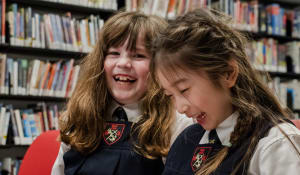It’s difficult for day schools to offer this same kind of close-knit, cohesive, and immersive cultural experience. However, schools with day and boarding programs usually try to integrate their day and boarding students, which gives day students a strong feel for boarding life.
Schools with boarding programs are often bigger (especially if they also have day programs) and more expensive. This gives them the infrastructure to offer a wider range of academic courses, programs, and opportunities than schools without boarders, which enables students to take many different subjects and explore their interests and passions.
Many boarding schools also offer challenging academic programs, like International Baccalaureate Programmes or Advanced Placement courses. They’re also more likely to provide enrichment and acceleration opportunities, such as independent studies, career exploration, and curriculum compacting.
Boarding schools also normally have plenty of academic support, including academic counsellors, tutors, and special education staff. Many also offer mentoring programs where older students guide and advise younger students.
Boarding schools are not just academic institutions. They’re widely known to prioritize and promote social and emotional development. Your child won’t just go to class and then go home. They’re part of a special community of kids (and adults) they live with, see each day, and interact and socialize with outside of school hours.
This can accelerate maturation and development. Since your child will be responsible for scheduling their days, getting to their classes on time, and attending mandatory events, they often become more independent. Without their parents to organize and manage their lives, they build their confidence and self-esteem. Boarders also become more proactive as they learn to advocate for themselves.
Boarding schools offer a unique experience. Boarders don’t just go to class together. They live together and interact with each other around the clock. They eat meals, hang out, and negotiate life’s obstacles together.
In this immersive environment, boarders often form close relationships. Boarding schools are famous for cultivating lifelong friendships in which peers sometimes feel more like family than friends.
Boarding schools offer an intensive and active social life. Sometimes, this means your child will have less time to “chill out.” They may find this challenging. When choosing a school, consider how much alone time your child will need and whether a boarding school can offer this.
As discussed, most boarding schools with day programs try to integrate their boarding and day populations. Sometimes this can be challenging as boarders often develop powerful bonds from living together, and many are international students. Most schools have well-thought-out initiatives and programs to help day and boarding students integrate. This can be rewarding for both, as they connect with people with different experiences and perspectives.
Boarding schools tend to be bigger and more expensive. This often means they have more resources.
Many boarding schools have academic programs and classes in specialized subjects like STEM, robotics, theatre, and fashion design. They also typically offer a wide range of extracurricular programs and activities, and state-of-the-art facilities like art studios, Olympic-sized pools, and 3D printers.
Boarding schools tend to have plenty of student support resources. These may include tutors, mentors, guidance counsellors, social workers, psychologists, university placement departments, and health and wellness centres.
Day schools sometimes don’t have this breadth of resources. Almost all, however, offer a range of academics, extracurriculars, and support services like counselling and mentoring.
Boarding schools have unique demographics. Here are some of their important features:
- Since boarding schools are typically more expensive, they often have more students with a higher socioeconomic status. However, many have financial aid programs to increase their socioeconomic diversity.
- On average, there are more single-sex (all-girls or all-boys) boarding schools than day schools.
- Boarding schools tend to have more international students and students from a broader range of cities and towns in the country.
- Boarding schools have kids with diverse personalities, interests, and values, just like day schools.
Some of the potential benefits of boarding schools:
- They save money on some child expenses (covered by boarding fees).
- They free families from dealing with transportation to school and activities. Students and parents can invest the saved time in more valuable pursuits.
- They enable students to immerse themselves in school life far more than the day experience. This can resemble on-campus university life.
- They can be great for kids who want to go all-in on academics and extracurriculars.
- They have diverse student populations. This can be especially valuable for kids from homogeneous communities.
- Boarders often develop powerful bonds with their peers that can last a lifetime. Living together can create a family-like environment.
- Absence makes the heart grow fonder: family time can be priceless when boarders reunite with their parents and siblings.
- They can promote independence and accelerate emotional maturation, preparing students for university.
- They can be a good solution if there’s friction in the family.
- If a family is often moving for work or other reasons, they provide stability.
Some potential drawbacks of boarding schools:
- Overall tuition can be significantly higher (for schools that offer both day and boarding, day tuition is about half that of boarding).
- Parents are less involved in their kids’ day-to-day activities. Even routine chores like transporting kids can be bonding experiences.
- Boarders normally have less freedom to vary their environment.
- They can make it more difficult for kids to maintain strong ties with current friends while still making new ones.
- Boarders have less freedom to vary their social groups.
- Boarders spend less time with their families throughout the year.
- They can make it more difficult for parents to provide continuous feedback to their kids during adolescence.
- Enrolling in a boarding school can be a major and challenging transition.
Boarding schools come in all shapes and sizes. Each has its own mission, goals, and values. They also vary widely in terms of academics, extracurriculars, and culture. Make sure you dig deep to get a complete picture of what a boarding school offers.
Here are some questions to get you started:
- If you have both day and boarding programs, how do you integrate the two groups of students?
- What unique methods of support and supervision do you have for boarding students?
- What is your academic philosophy and approach, and how does that relate to the boarding program you offer?
- How does your boarding program connect with the extracurricular activities at your school?
- How do you help students negotiate the transition to boarding school?
- How do you help students become more independent and self-sufficient?
- How do you support students' social and emotional development?
- How do you communicate with parents?
- What kinds of academic support do you offer kids (e.g., tutoring, mentoring, academic counselling, special education staff, etc.)?
- What kinds of social and emotional support do you offer kids (e.g., counselling, therapy, social work, health and wellness programs, etc.)?





















